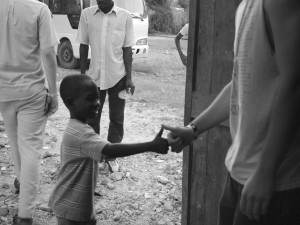Waiting at the terminal gate, I was surrounded by Haitians and Haitian diasporans. I was one of only a handful of blan (white/foreigners) waiting for the plane to arrive, the one that would take us directly to Port-au-Prince. Despite quiet attempts to avoid bringing attention to myself – a tactic employed for as long as I can remember – my visibility was made clear by the tri-lingual ticket attendant making announcements in Haitian Kreyòl, French, and English. I didn’t question her when she walked straight toward me, demanded my boarding pass, and walked away without even the slightest of explanation.
I failed to question her, and chose instead to glare at her from my seat, waiting for a signal.
It wasn’t until we started boarding, an hour and a half late, that I realized she had bumped me to first class. New ticket in hand, I was both angry and embarrassed. What had I possibly done to deserve this upgrade? I wasn’t a frequent flyer. Maybe I should have been happy? I wanted to return to the ticket counter, demand that she give the seat to someone who needed the extra space it afforded. My shyness prevented me from speaking up and I fumed silently instead. From my view, the attendant had clearly targeted me as one of the few blan in the seating area. My whiteness stuck out like a sore thumb.
The visibility of my race was not the only identifying marker made apparent in that moment. In fact, my white skin had succeeded in falsely inflating my class status. This became clear as I lumbered down the jet bridge along with the other first-class passengers. As I worked my way to the jet bridge in my wrinkled t-shirt and jeans, a smartly dressed (business?) man in front of me mumbled to himself, “Is this how the business class dresses now?” He appeared to be a Haitian diasporan but could also have been an upper-class Haitian with important business or political connections. I imagined him, with his sunglasses prominently thwarting eye contact and his perfectly pressed suit, as the next dictator of Haiti. Or perhaps a former tonton makout, a member of the ousted dictator’s secret police force. I felt my normally lower-middle-class American mannerisms betray me in that moment, my status as a graduate student failing to cover the reality of the class-based disposition with which I felt most comfortable. Refusing to be fooled by the color of my skin, this man brought my belonging forcefully into question. I was not an individual; I was what others assumed about my race and my class status.
 “But everywhere the unflagging dialectic of amity and rivalry, love and hate, closure and openness, identity and difference, acceptance and denial is driven by the same human desire for some kind of balance between autonomy and anonymity.”1
“But everywhere the unflagging dialectic of amity and rivalry, love and hate, closure and openness, identity and difference, acceptance and denial is driven by the same human desire for some kind of balance between autonomy and anonymity.”1
But my second trip, a year later, was different. Not just in terms of the city I was flying from – Miami instead of New York – but in terms of the passengers and the atmosphere. This time, I was one of many blan traveling there. In fact, the vast majority of passengers were blan with a small number of Haitians and Haitian diasporans. Like the first trip, I kept to myself. Looking around at the passengers gathered in the terminal, I tried to distinguish my objectives as different: An anthropologist traveling to Haiti to carry out research, not to evangelize, offer humanitarian aid, or act as an “expert” of sorts. I wasn’t going there to tell Haitians how to “fix” their problems.
Mentally, I created categories. There was the large church group, dressed in the same custom-designed t-shirts, desiring to “help” poor Haitians (and maybe evangelize in the process). One member traveled with a guitar, its case proclaiming “Jesus is my friend!”
Another group was made up of middle-aged “experts,” predominantly male and dressed in hiking shorts, tennis shoes and tucked in plain t-shirts. They were prepared for uncertain conditions with their hiking backpacks with gear attached and tucked into every free loop and nook. This group was also packing their elaborate plans and projects aimed at developing the country along with the conviction that their specialized knowledge surpassed that of most Haitians.
My desire to distinguish my objectives from those of missionaries and aid workers sat uncomfortably with a feeling of guilt as I was traveling to a country with so many unmet needs. What productive results could possibly come from my research? I was reminded of Rosaldo and his analysis of the equally problematic role that ethnographers, alongside missionaries and aid workers, play in the societies we enter. Even if my agenda was different, it was still an agenda. Was I using “a mask of innocence to cover [my] involvement with processes of domination”?2 Anthropology, after all, has a history of colonial entanglement. Does that make me an imperialist?
Departing the airport amidst a tidalwave of blan, it might have resembled a new colonial enterprise, harking back the 1915-1934 American occupation. But there were no guns in this particular invasion. No, these blan brought “help” in every shape and form imaginable. And instead of an army with collective ambitions and goals, this was a group of blan, each carrying individual, disjointed objectives and heading off to individual destination points. I reeled from the speed with which large number of blan traveling in and out of the country nearly disappeared from sight on the street level where ordinary Haitians went about their daily lives.
1 Michael Jackson, “Minima Ethnographica” (1998), pg. 207.↩
2 Renato Rosaldo, “Culture and Truth” (1983), pg. 86.↩
